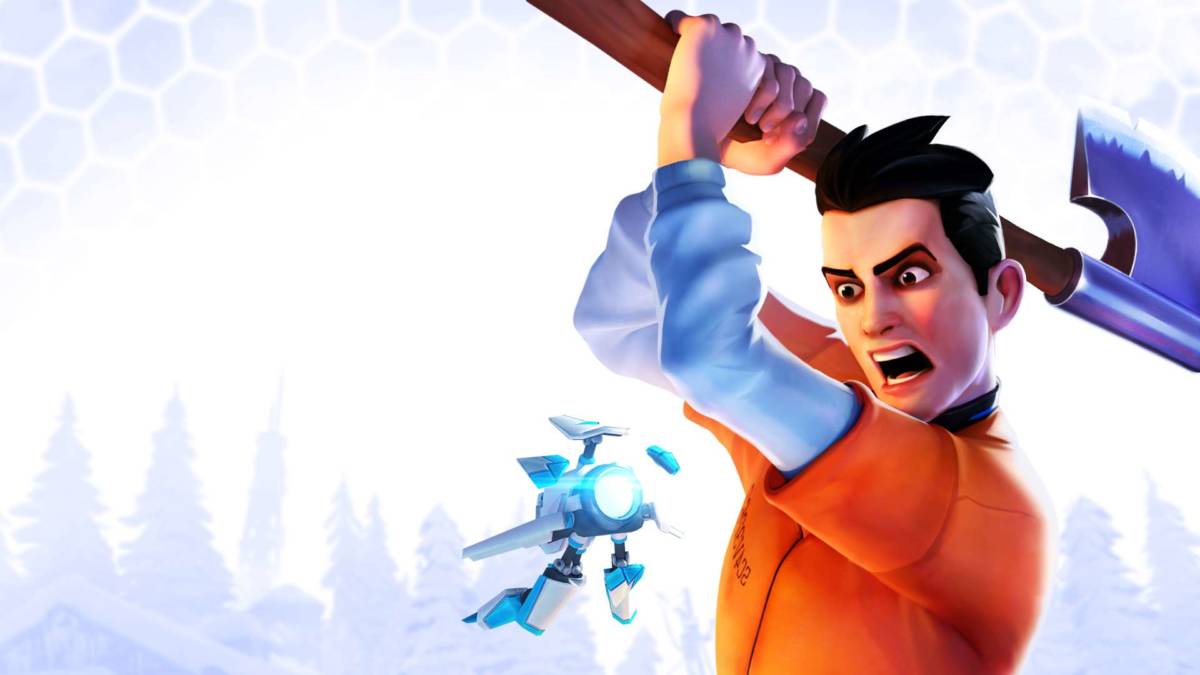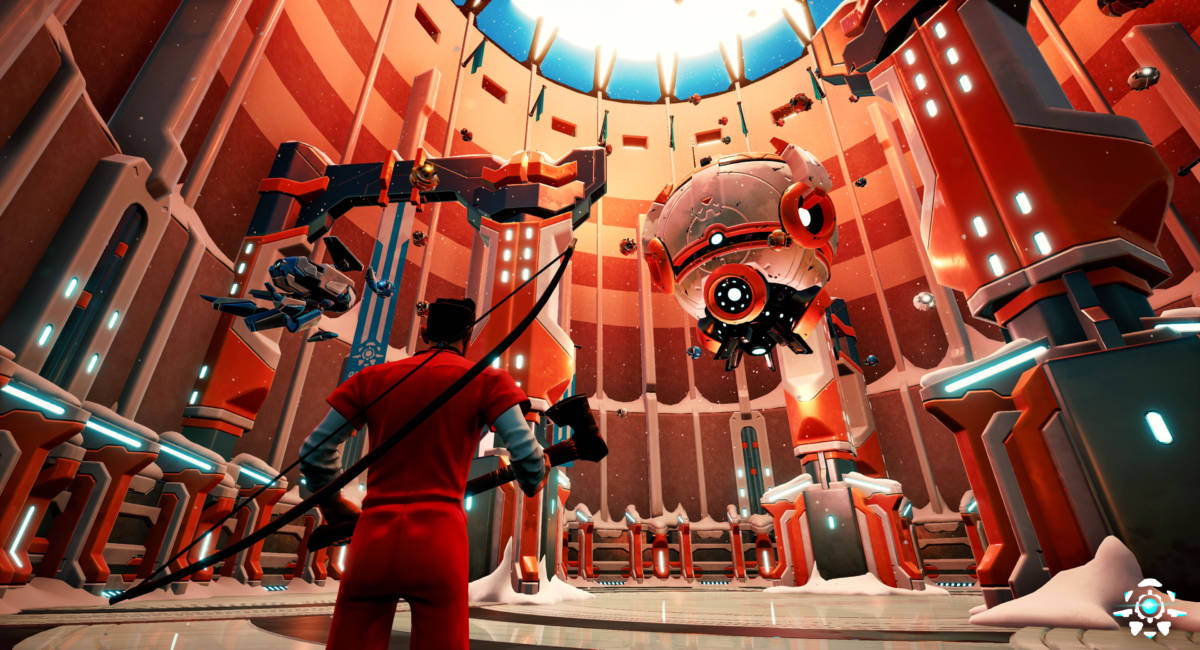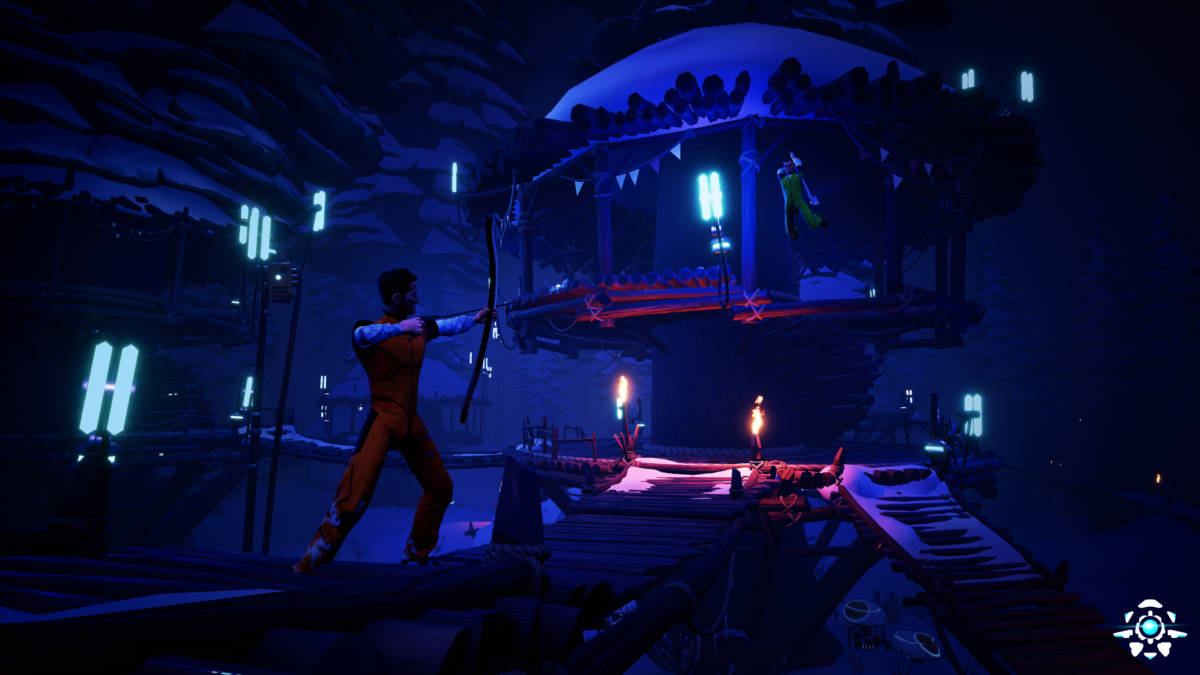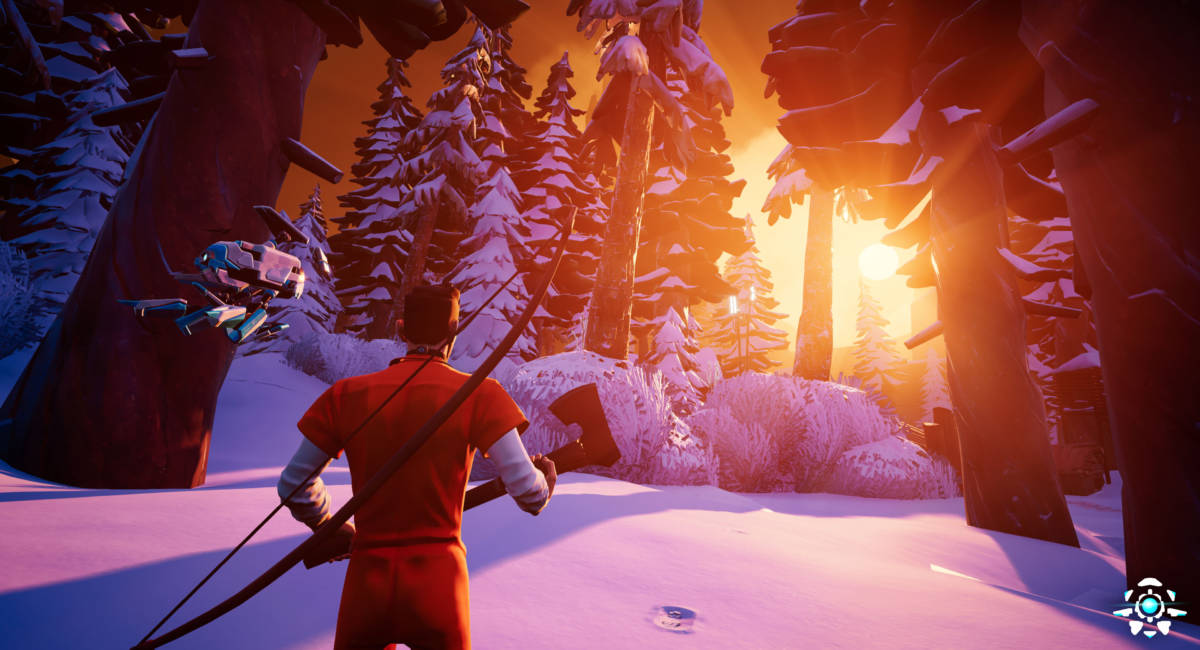In a crowded battle royale scene, Scavengers Studio’s Darwin Project may not look very different at first glance, but this solo experience is an atypical treat in the genre.
Its inventive design puts it in a category of its own, attracting players who prefer fast-paced showdowns that place less emphasis on loot and more emphasis on mastering its various gameplay elements. With a growing base of loyal fans, Darwin Project looks to be carving out a niche that will allow it to grow and dominate its own corner of the battle royale scene for years to come.
I recently had the opportunity to talk to the game’s producer Zack Hiltz and pick his brain about the design process of Darwin Project and what the future holds for this unique battle royale experience.
I’ve been playing Darwin Project quite a lot on my PS4 this month, and one of my favorite aspects is how the game doesn’t place as much emphasis on loot. Gathering wood and Darwinium can certainly improve your suite of options, but they never feel like a requirement to be viable in a fight. Can you explain the process of balancing the game in such a way that incentivizes looting without making it an overbearing requirement for winning fights?
We wanted to design a battle royale experience where, no matter what is thrown at you, player agency was always paramount and we sought to achieve this in a number of ways. First, our core combat mechanics are all centered around the Axe (melee), the Bow (ranged), and your Mobility options (largely based on your Class Gear) – all of which you start off with when the match begins.
Because combat is centered around an Axe and a Bow, you won’t suddenly find a machine gun hiding in a crate by a tree, instead you might find some much-needed utility in the form of a Trap or a Smoke Bomb. This way, every combat encounter, be it early game with zero loot or late game and fully decked out, combat still ultimately boils down to that trinity of Axe, Bow, and Mobility. Mastering this core gameplay is key to surviving in Darwin Project whether you’re fighting other players, surviving Show Director Powers or traversing a dangerous environment.
In essence, looting chests and upgrading your Class Gear throughout a match becomes a matter of, as you said, improving your suite of options. Someone with a Glider in their inventory and three levels of Fuel Efficiency crafted on their Jet Wings may be able to out-maneuver a superior player, but it doesn’t all of a sudden make them a better shot with their Bow. A player who has a firm grasp on Axe and Bow combat that knows how to use their Mobility to land a blow is a force to be reckoned with at any stage of a match.
As we continue to expand on features and game balance, we want to retain the importance of that core trinity so that players always feel they’re in control. In other words, despite the fatalistic trappings of a Battle Royale’s last-man-standing style gameplay, we always want the player to feel like survival is up to them, and that they’re always able to adapt to the chaos of a Battle Royale, and not simply become a victim of it when the loot isn’t in their favor.
Another unique and endlessly fun element of Darwin Project is the Director Mode, allowing an 11th player limited control over components of the match from afar to either assist or impede other players in various ways. What gave the team the idea for such an inventive feature? And was there ever discussion during development about giving the director full control over the entire match?
When it comes to the grim nature of indentured contestants forced into an extravagantly televised blood sporting event, I’d say we wear some of our inspirations on our sleeves. Among them is the concept of an all-seeing Show Director that adds their own unique spin on every match. But crucial to fulfilling this fantasy of a playable Show Director was the notion of playing to the ‘crowd’, and we thought: what better crowd than a real-life audience?
Since our inception, Scavengers Studios has been at the forefront of building gameplay opportunities for viewers just as much as players. For example, through Twitch extensions on PC, we’ve given audiences the ability to directly influence matches hosted by the streamers they’re following – who were often hosting as Show Directors. Through the Extension and the bidding of a Show Director, audiences are able to take part in Votes to activate zone powers, reward players with resources, pick a crowd favourite, etc.
Lately, they’ve even been given the ability to invade an ongoing match as a surprise super-powered contestant. So rather than give a Show Director full control over the entire match, we felt the control belonged to the symbiosis between the Show Directors and their crowds. With this, the Show Director became a sort of conduit, a Master of Ceremonies that bridged in-game players with the streaming audience at large in a way we’ve never really seen before. This MC role of theirs takes on a whole new life of its own when you couple it with where we’re at in the video game industry today.
As E-Sports and streaming culture continues catapulting through pop culture, there comes the added bonus value of personality. While a Show Director can use their omnipotence to drastically change up the flow of a match, it’s the potential for their personality to shine through in this role that I feel makes the system very unique.
For example, if you don’t mind an anecdote:
Before I joined the team at Scavengers Studios in 2018, I played the game in Early Access once at a gaming event in Montreal. I enjoyed the aesthetic, the pace and the flow of combat, but it wasn’t until I played it again at home a month or so later that I truly realized how special of a gaming experience it could be.
I was playing a standard match on my PC and in came this Show Director (sorry for forgetting the name!) who had an amazing radio voice and immediately started energizing the players as he had begun shoutcasting the match live, going into detail about what kind of cool things were happening on the map, what plays were being made, etc. Then he focused on me. It was mid-game and I was locked in a drawn-out melee with another player. We’d spent all our arrows and were rolling around trying to get the jump on the other with our axes.
I had done this before, but now this Show Director was shoutcasting everything he saw play-by-play for us to hear as if we were the star players in some sort of series championship final. Eventually, I mistimed what could have been the final blow and ended up dying myself, sending the Show Director into a crescendo, announcing the outcome and congratulating the victor before moving on with the rest of the match. I was defeated, but that moment in the spotlight eradicated any pain of loss for me.
Since then, I’ve met a number of exceptional Show Directors who really own that role, imparting their personality to make it special for everyone involved. That might’ve been the first time I ever felt that way playing a random non-tournament game at home, but with Darwin Project, it wasn’t the last. This perfect storm of Show Directing combined with a growing culture of streaming personalities and skillful shoutcasting is creating this new layer of entertainment that I never knew I wanted.
The class system in Darwin Project gives players choices between defensive and offensive playstyles. What can you tell us about classes going forward? Are there any plans to expand on the existing classes or add new ones?
When designing the three classes at launch, we wanted to empower and celebrate the kinds of playstyles we were seeing emerge from our pre-release communities. These ranged from the hyper-aggressive Axe fans who were always looking for ways to close the gap (enter: Grapple Gauntlet), the master hunters who relied on situational awareness to track targets all over the map (enter: Headhunter Drone), to those who loved flying around on Gliders and trickshotting enemies mid-air with their Bows (enter: Jet Wings). In that regard, we still have a number of other playstyles that we would love to cater to via our class system in the future.
Outside of the pure gameplay aspect, we also really want to expand on how the class system fits in with the Darwin Project lore and setting. We will have more news to share on that soon.
Will we see any new maps or zone overhauls as Darwin Project continues to grow?
Short answer: Yes-but-let-me-direct-you-to-the-long-answer-please-and-thank-you. Our map is actually a series of smaller maps or zones (that we call Tiles), randomly arranged into 7 interlocking hexagonal pieces. We have about a dozen unique Tiles, currently, that vary in both look and feel but also in the gameplay opportunities they provide. In a single match of Darwin Project, you might go from tracking an enemy out in the open across a serene frozen lake, to having an intense game of cat and mouse amidst a sea of shipping containers in a construction yard, to an epic axe-on-axe showdown on a wooden bridge suspended over a river of lava.
Due to this procedural nature, you never know what Tile you could be next to, and as the playing field continues to shift throughout a match and you’re forced to travel to a new zone (nukes don’t outrun themselves), sometimes the contrast between two neighboring Tiles can be just as important as the Tiles themselves. With this in mind, rather than build entire new maps, we continue to work on new Tile sets that can present unique gameplay opportunities both as a standalone zone but also when juxtaposed with other Tiles from our growing collection.
Is there a story behind using ramen as a currency? Is this an inside joke among the team or a completely random decision?
Use of ramen as a currency is actually inspired by what’s going on in the world today across many North American prisons. Ramen has been known to become a highly sought after item among prisoners for use in bartering, so much so that it’s become its own form of currency. There are books, articles, and videos out there that document this in much better detail than I ever could, but due to our game also taking place in a prison (albeit in a sci-fi prison complex somewhere in post-apocalyptic Canada), we felt using ramen as an in-game currency fit nicely into our narrative structure while being an exaggerated reference to their new-found value.
As it stands, Darwin Project is a small-scale, solo battle royale. That said, the team toyed around with a duos mode a while back but wasn’t quite happy with the way things turned out. Is it possible we’ll see another team mode of sorts at some point, or will Darwin Project always be a solo game?
It is true that during our Early Access period we were developing a Duos mode that allowed teams of two to tackle a match of Darwin Project together. We temporarily put it on hold as we prepared for the full launch since all of the new gameplay systems we were introducing meant that we would need to re-evaluate how team-based modes would function mechanically. We absolutely recognize that there is a hunger to play Darwin Project easily with friends and we wish to accommodate that. We will continue to develop and play around with team-based modes and hope to have more news to share on that front shortly.
In a time when battle passes and “seasons” are dominating the industry, a select few have criticized Darwin Project for not having long term goals for players to work toward. Is this a feature the development team is considering at some point, or do you feel confident that the current daily challenges offer enough incentive for the average player to stay engaged?
It is indeed a goal of ours to provide long term… goals. We have experimented with various progression systems internally, and during our Early Access period we even did a Battle Pass around Halloween of 2018 that emphasized some of the oft hinted at lore behind Darwin Project. We will have news to share shortly, but keeping players engaged with our game and continuing to have fun while feeling their progression is worthwhile is absolutely something we want to do.
Darwin Project is now available on PC, Xbox One, and PS4. Are there any plans to bring the game to Switch players?
How ‘bout we Switch topics…?
We unfortunately cannot comment on any commitments to a Switch port at the moment, but are always on the lookout for demand and eager to satisfy that demand wherever possible. Right now we’re just happy we were able to make the release date in time for a simultaneous launch on three platforms, especially considering the PS4 was a new one for us.
What can you tell us about Darwin Project’s timeline in 2020 in terms of events, additions, and general updates?
You can refer to this link for all up-to-date news regarding Darwin Project and any announcements.
We actually just dropped our high-level roadmap detailing the major points we want to hit in 2020.
Primarily, we want to add things that really emphasize what Darwin Project is about and dig into all the fun things we can play around with this toy box we’ve built. Namely, we want to continue working on our Spectator Interactions to further empower the untapped potential of video game viewership. We will be releasing Battle Pass content that aims to peek more into the lore of Darwin Project, as well as generate new cosmetic options for our players to build their own look and persona. Live events are another priority topic for us and hope to have something to share soon. But when it comes down to core gameplay, we recognize just how much impact new classes would bring to the game experience and are eager to see what kind of creative plays our community will dream up next.
Darwin Project is free-to-play now on PC, PS4, and Xbox One, and maybe we’ll hear something about that Switch release someday. Fingers crossed.
READ NEXT:
– 20 Best PS4 Story Games You Should Play
– 15 Best PS4 Split Screen Games You Should Play With Friends
– 20 Best Stealth Games To Sneak Into Your Library
Some of the coverage you find on Cultured Vultures contains affiliate links, which provide us with small commissions based on purchases made from visiting our site. We cover gaming news, movie reviews, wrestling and much more.






